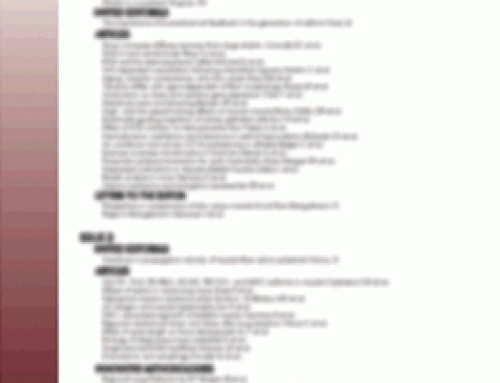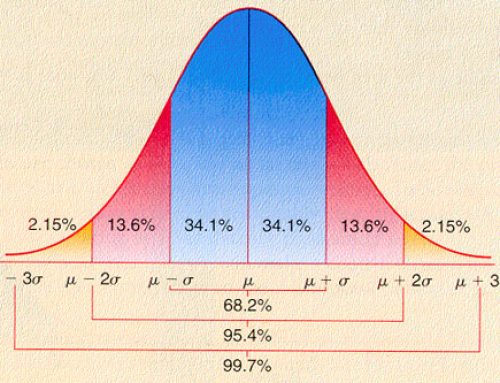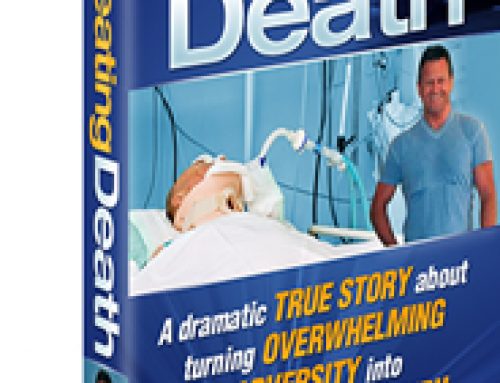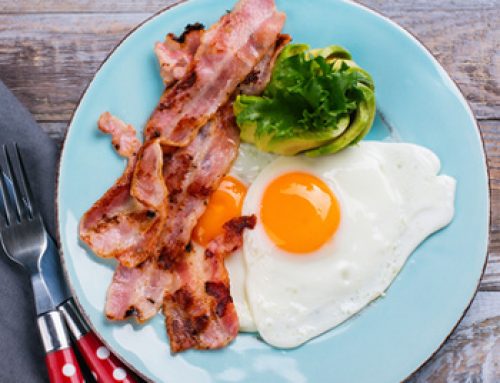Coach Jamie Hale is a sports conditioning specialist, fitness author, independent researcher and nutrition consultant. His scientific and critical thinking approach has led him to be nicknamed, “The fitness skeptic”, as he is well known for tackling fitness myths and encouraging critical thinking and debate on all matters of diet and exercise. In this new feature, Jamie interviews me about my latest book, some of the favorites on my bookshelf, my favorite exercise and how I approach fitness skepticism and reading scientific research…
Jamie Hale: All the reviews I have read on the Body Fat Solution (your new book) are excellent. What audience was the book written for? What inspired you to write the book?’
Tom Venuto: Thanks Jamie. The Body Fat Solution is for a different audience than my first e-book. The new one is in hardcover and it’s for regular people who have every day challenges like busy schedules, high levels of stress, restaurant eating, frequent travel, family commitments, social pressure and so on. It’s for men and women who are overweight and struggle with problems like emotional eating, binge eating, lack of motivation or self sabotage. So instead of just focusing on eating and training, I help my readers with the emotional, psychological and social aspects of weight loss.
I was inspired to write the book because I saw a pattern emerging in the mainstream diet and weight loss books. Not only is the entire diet industry built on novelty, but also on something I call “information isolation.” That’s where one “evil culprit” is blamed as the ultimate cause of the obesity problem, or one “magic bullet” is given credit as the cure. In diet book publishing, they call it having a “hook.”
They’ll say the cause or the cure is in one hormone like cortisol, insulin, testosterone, leptin, estrogen and they put a spotlight on it. Or they’ll just focus on one vitamin, one mineral, one macronutrient ratio or one macronutrient like carbs. They’ll pin it on inflammation or acidity or toxins. They’ll say that if you fix this one little thing, your body fat problem will be solved.
On one hand, the obesity problem really is as simple as a calorie surplus, but the causes leading to that energy imbalance are so complex and numerous it’s mind boggling when you really analyze it. You can’t pull out one piece of such a complex problem and expect that to solve it. A real solution has to uncover and address the problem from ALL the root causes, so that’s how I approached it – from every angle.
Jamie Hale: How long did it take to write Body Fat Solution? What makes this book so different than other diet books?
Tom Venuto: It took longer than I expected – about a year and a half from conception to completion. I spent a lot of time on research and a lot of time went into planning and creative work because both of my books are about fat loss but I wanted the new one to be significantly different than the first.
Mostly what makes it different is that The Body Fat Solution is not a diet book in the traditional sense. The Body Fat Solution was designed to help you stick with whatever nutrition and training programs you choose to make it a part of your lifestyle and help you maintain your ideal weight for life.
Most people already know what they should eat – more fruits and vegetables, lean proteins, EFA’s, small portions, etc, etc. My question for dieters today is, do you easily stay motivated to follow your program or do you find yourself blowing it on weekends, giving in to cravings, falling off the schedule when traveling, eating when stressed, or doing anything else that sabotages a good nutrition plan?
In the end, it’s not what diet you follow, it’s what makes you follow your diet. That’s why I focus on the emotional, psychological and even social (how people influence you) aspects of staying on the program
Jamie Hale: Take us through a typical day in the life of Tom Venuto.
Tom Venuto: Since 2004 I’ve been a full time writer, researcher, consultant and internet publisher. Prior to that I had been managing health clubs and training people since 1989. I now work at home, so I’m usually up by about 6:30 (except when I’m not). I eat and drink some coffee then I’m off to the gym to meet with my good friend and trainer Richie Smyth at 7:30 two day a week. He’s a competitive NPC bodybuilder and martial artist and I train with him because (A) I like to have someone kick my ass and (2) sometimes I don’t want to have to think about my workouts, I just want to show up and do the workouts. The other days of the week I usually train around 10:30 am. I like to train in the morning but actually prefer doing it after I’ve been awake a few hours, and I have a couple meals and some coffee in me. I spend most of the rest of my time these days reading research or in front of the computer, writing, publishing web pages, blogging and answering questions on the forums of my Inner Circle member’s-only site. If I’m competing, I sometimes double split my training and will do cardio and or a smaller body part like abs or calves later in the day.
Jamie Hale: Favorite nutrition book?
Tom Venuto: That’s tough to choose. I don’t think I can name one favorite. But one I really enjoyed was Brian Wansink’s Mindless Eating because a lot of my work lately has been about behavior and psychology and Wansink did a great job with those subjects. Do I get any points by saying that Knowledge and Nonsense by Jamie Hale is right there on my list of favorite nutrition books?
Tom Venuto: Favorite exercise book?
Tom Venuto: Honestly, it’s almost impossible for me to pick a favorite. I read everything and learn a little bit from everyone. I read scientific textbooks, lay press books and I still read bodybuilding books. Most of the training info published these days is anti-bodybuilding so there’s actually a real lack of good books for bodybuilding and hypertrophy information, in my opinion, but there are still lots of people like me who are interested in it.
Jamie Hale: Favorite book other than a exercise or nutrition book?
Tom Venuto: Ah, you’re killing me. It’s so hard to pick favorites. Can I just mention the last several books I read that I enjoyed: Talent Is Overrated by Geoff Colvin, Tribes by Seth Godin, The World is Flat by Thomas Friedman and Tricks of the Mind by Derren Brown – You might like that last one Jamie, it will remind you of James Randi.
Jamie Hale: Favorite exercise?
Tom Venuto: High rep squats. It’s a love hate type of relationship, if you know what I mean, but I love the challenge. Tom Platz was always one of my bodybuilding idols. He squatted 500 lbs for 23 reps, high bar style, rock bottom. Crazy.
Jamie Hale: Any advice for beginning writers?
Tom Venuto: Write every day. Make it a habit and a discipline. The more you write, the better you get at it. With blogging, everyone has a platform and an opportunity today and if you consistently write quality material, you can get a loyal following faster than you might imagine and then move into other stuff like magazine articles and books.
Also read a lot. I read at least 2-3 books per week and I subscribe to about 7 or 8 scientific journals, plus I read dozens of research papers every month. I listen to audio when I drive as well, almost never music in the car. The university on wheels I call it. The more good stuff you put in your head, the more ideas and material you have to churn out when you write.
Jamie Hale: I realize Tom you, much like myself, are a big fan of Fitness Skepticism. How do you explain this concept to your audience?
The fitness industry is full of misconceptions and myths as well as bla
tant scams and lies. As Winston Churchill said, “A lie gets half way around the world before the truth has a chance to get its pants on.” If Churchill could only see the Internet today! If you don’t become skeptical of fitness, weight loss and especially supplement claims, you’re going to get taken to the cleaners. Not only that, you’ll waste a lot of precious time and you’ll remain lost, confused and full of self-doubt, always second-guessing yourself.
The best thing you can do is to question everything until you’ve verified the original source. Second hand information and even expert opinions are highly unreliable. Your article on the fallibility of experts was excellent by the way. When you reconcile the peer reviewed research findings with your personal real world experience, you can come to the best conclusions about what really works.
On the other hand, it’s easy to come to the wrong conclusions about how your own results were achieved. You got results and that’s what counts, but you may believe weird stuff about how you got those results. A occurred, then B occurred, therefore you conclude that A caused B. Post hoc ergo propter hoc. For example, you take a fat burning pill and suddenly begin losing weight, therefore you think the pill caused your weight loss. But your weight loss could have come from a dozen other things, like how about the nutrition and training program you started at the same time you started taking the pills?
That’s why you even have to question your own beliefs. Admitting that you were wrong about something you believed can be one of the toughest things you’ll ever do, but that’s the mark of a great and expanding mind.
Jamie Hale: Tom you have a reputation as being one of the few in the fitness industry that knows how to interpret scientific research. Any recommendations on how others can enhance their ability to understand the sometimes complex nature of scientific research.
Tom Venuto: Number one is to develop an appreciation for science and to do some reading on the basic tenets of the scientific method. Read some good books about science. I recommend The Demon Haunted World: Science as a Candle in the Dark, by Carl Sagan.
Second, you should learn to appreciate and do some reading about critical thinking. Also, learn about all the logical fallacies and learn how to form a coherent argument and to intelligently debate.
Third, read some books about skepticism. Michael Shermer is a good place to start and Gilovich’s How We Know What Isn’t So is another good one. I don’t go too deep though, because I feel that skepticism can be taken so far that it begins to shut down your imagination, deter creative thinking and close you off to new possibilities. I think skeptically when I need to, but I wouldn’t say I’m a skeptic.
Once you’ve developed a scientific and critical thinking process, then it’s easy to make sense of news, research and advertising. When you see the media reports about the latest study, you can immediately see that in their eagerness to spin a good news story quickly, they usually do a pretty poor job of conveying what actually happened in the study. You start to easily see through the lies and manipulation of research statistics that’s constantly being used in fitness infomercials and supplement advertisements.
Incidentally, most people will stop their research as soon as their beliefs are verified – confirmation bias is what they call it. If you want to really understand a subject, it’s important to immerse yourself in it completely, understand both sides of an argument and see the whole body of research. If you claim to be scientific but you just pick and choose bits and pieces of the data, you’re right back at the information isolation problem aren’t you?

About Tom Venuto

.






Here’s the link I mentioned. The casein hydrolysate and protein cycling portions pick up several pages into the thread.http://tnation.tmuscle.com/free_online_forum/sports_body_training_performance_bodybuilding_author/thibs_qa_up_to_the_end_of_may
Excellent interview!Mr. Venuto,It would be interesting to see you and coach Hale tackel some of the issues regarding daily nutrition and para-training nutrition for optimal hypertrophy that were posted at the following link.http://tnation.tmuscle.com/free_online_forum/sports_body_training_performance_bodybuilding_author/thibs_qa_up_to_the_end_of_mayObviously you’re both quite busy and there are several pages worth of Q and A in that link, but it would be excellent to hear two of the most cerebral and honest men in fitness discuss what is solid advice versus what is myth/fiction/hearsay (particularly regarding casein hydrolysate and the concept of protein cycling).I’m all for refining and optimizing, but it can be quite difficult to note where dedication and optimization end and where obsessive-compulsive eating habits that don’t necessarily add much in the way of “real-world significance” in terms of results begin.I realize that this is a long-shot given the scope of the linked thread and your work demands, but I thank you for reading my message and even remotely considering my request.
I’ve just ordered Mindless Eating, thanks for the tip!
I am a trainer and am in the process of training four people for competition in the future. I find your newsletter info so helpful for what I am doing, thanks. The biggest challenge I have with anyone I work with is getting them to change their eating habits. If you have some suggestions, keep them coming in future blog posts.
Dear Tom,I enjoyed reading your interview w/ Jamie and was the recipient of the Burn the Fat emails (your email mini course) over the past few months.I have lost 32 pounds (from 151 @ 5’5″, 53 yrs.old) over the past 4 months and totally agree with your assessments and analyses that confirm that it is what motivates the exerciser/dieter, not just “what they eat/drink/what supplement they take” solution.It’s not just exercise though, as you so rightly recognize. I am a 5-time NYC marathoner with above average times for my age aand a formerly (not presently due to knee surgery aftermath+ arthritis) very competitive tennis player (USTA Leagues + 5+ times a week year ’round) and STILL, I was a fatso. So unhapy. Now I am feeling as if I can do anything that I put my mind to. Am busy w/ husband and two children..one a freshman in college and the other, a junior in high school trying to get recruited to play college football…so I’m still “on the job” at home…but the new physical freedom…and the mental release…it’s a joy and I think that your writings and experience really helped me as I couldn’t just read the diet of the month book.Many thanks for your insights and inspiration. Sincerely,Lauren Fessenden
Dear Tom,I enjoyed reading the article; and I always appreciate it when you make a point of noting that dissection of articles and research is paramount. I started losing weight in the fall of 2006 from about 320 pounds and ended up at 170 pounds. Following your advice and knowledge and making it a part of my life let me be able to put on about 50 pounds of muscle in the past two years. To put some perspective on where I was in relation to where I am now, I started benching 135 and squatting 225. I now bench 275 and squat 515 and sprint a 4.2 second forty yard dash.The reason I mention that is because I’m always seeing information on the news about the next “new thing” or “is exercise REALLY doing this for you?”Reading the articles becomes appalling. Just seeing the way people twist research and studies is awful. Looking at my own experience, coming from an obese highschooler to a top level athlete practicing the very principles the media condemns makes me laugh.Just this morning I read an article on MSN.com saying that exercise did next to nothing for a raised metabolism after the exercise and that weight loss hinged only on food.I was appalled at the article. It only tested long distance cardio, was a short term study, didn’t touch on body composition, nor the metabolic systems used by exercise: Carbohydrate, fat, ect. The study almost implied that they were trying to make results appear to have a a certain result, ignoring other completely relevant factors.I just wanted to let you know that I always like it when you emphasize the wisdom of getting informed and knowing what works for you and that the media and research often times manipulates the facts and the mindset of the public to get attention on their research, just like in the article I mentioned. It’s soothing to know that there is one person that can encourage people to gather the facts and achieve great thing.A fan and sucess story,Chris Bradford
Hi TomAs a public health specialist in the UK I value your emphasis on understanding scientific research, but it is far from easy for many people.Here in the UK the National Health Service has set up a great feature athttp://www.nhs.uk/News/Pages/NewsIndex.aspx called Behind the Headlines where they take a story that has appeared in the news and in plain English report where the story came from, and whether the claims made are backed up by research.Anybody that wants to get a basic understanding of the scientific method and understand how supplement sellers, amongst others, misuse science, should get hold of Bad Science by Ben Goldacre. It’s the funniest way to learn about how science works, and how people misuse it.